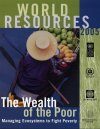![World Resources 2005: The Wealth of the Poor World Resources 2005: The Wealth of the Poor]()
Click to have a closer look
About this book
Contents
Related titles
About this book
An invaluable contribution to the growing debate on how preserving and maintaining healthy and diverse ecosystems is as critical as aid in the fight to combat poverty.
From the publisher's announcement:
Ecosystems are - or can be - the wealth of the poor. For many of the 1.1 billion people living in severe poverty, nature has always been a daily lifeline - an asset for those with few other material assets. But programs to reduce poverty often fail to account for the important link between environment and the livelihoods of the poor.
World Resources 2005 argues that the generative power of nature - the bounty of ecosystems - can act as a fundamental stepping stone in the economic integration of the poor.
This requires, first, that the poor manage ecosystems so that they attain - or regain - stable productivity over time. But it also requires that the poor are able to reap the benefits of this good stewardship. Unfortunately, those poverty are rarely in such a position of power over natural resources. An array of governance failures typical intervenes: lack of legal ownership and access to ecosystems, political marginalization, and exclusion from those decisions that affect how these ecosystems are managed. Without addressing these failures, there is little chance of using the economic potential of ecosystems for reducing poverty.
World Resources 2005 details the steps necessary to empower the poor to use ecosystems both wisely and for wealth. Using examples and case studies, the report traces a route to greater environmental income. Working at the cutting edge of sustainable development, it lays out the governance changes necessary to give the poor the legal, financial and management capacity to use nature for wealth creation that does not deplete their fragile resource base.
Eleventh in the World Resources series, World Resources 2005 also expands beyond the poverty theme, presenting national statistics and interpretive graphics on current environmental, social, and economic trends in more than 150 countries.
Contents
Chapter 1 Nature, Poverty, And Power; Chapter 2 Ecosystems And The Livelihoods Of The Poor; Chapter 3 The Role Of Environmental Governance; Chapter 4 Parlaying Natural Assets Into Wealth; Chapter 5 Pro-Poor Forests And Fisheries; Chapter 6 The Millennium Development Goals: Keeping Ecosystems And Governance In Mind; Special Break-Out Section Global Trends In Environment And Development; Data Tables 12 Separate Tables, 160 Variables; 150 Countries; Additional Tables Available At http:// earthtrends.wrl.org
Customer Reviews























